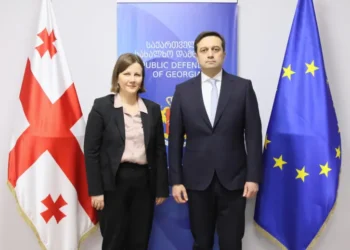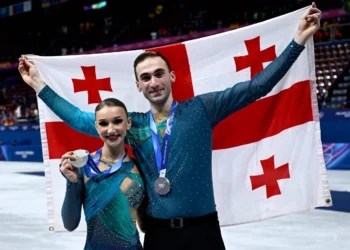The Georgian army fought well, really well — especially considering that one of their brigades was deployed supporting NATO operations at the time. They didn’t even have their full force at home, and they still went head-to-head with the Russians, – says Colonel (retired) Liam Collins, PhD, who served in the U.S. Army for 27 years and is now executive director of the Madison Policy Forum. A senior fellow with New America and a permanent member of the Council on Foreign Relations, Collins conducted field research in Georgia following the 2008 Russo-Georgian War, and in the Baltics to study their defense postures against Russia.
In this in-depth conversation with RFE/RL’s Georgian Service, Collins discusses what Russia, Georgia, the West — and Vladimir Putin personally — took away from the five-day war. He dissects the Kremlin’s shift from conventional force to hybrid tactics, critiques Washington’s slow-footed response, and outlines how lessons left unlearned in 2008 paved the way for Crimea, Donbas, and eventually the full-scale war in Ukraine.
He also weighs in on the controversy around when the war actually began, the debate over whether Saakashvili fell into a Russian trap, and the domestic political attempts in Georgia today to reassign blame, nearly two decades later.

Let’s begin with the legacy and lessons of the 2008 war — what’s been learned, and what hasn’t?
One of the biggest lessons Russia took from it was not to send a large force across the border. Instead, they shifted to what’s now called grey zone warfare. Between 2008 and 2014, they really built on that concept — and executed it to perfection when they took Crimea without even firing a shot.
They also realized their conventional forces weren’t that good, and that they needed to fix it — especially their information operations, which they doubled down on. The 2008 war was really the first time we saw cyber operations used alongside a military offensive.
But then, of course, Russia forgot all of that when they invaded Ukraine en masse in 2022. Before that, though, grey zone tactics had allowed them to take a good chunk of Donbas, under the label of “separatists.”
And what did Georgia learn in 2008?
That it had a very capable military. One of the bigger surprises of that war was just how effectively the small Georgian army fought — especially considering that one of their brigades was deployed supporting NATO operations at the time. They didn’t even have their full force at home, and they still went head-to-head with the Russians.
They fought well, really well. In the end, it was Russia’s sheer mass that made the difference. So one could say there was absolutely no shame in that defeat. Georgia did better than anyone would have expected.
After the war, though, Georgia was left in a tough spot. Where should they go for allies? NATO isn’t eager to take in countries with occupied territories. And that, I think, is another lesson Russia learned from this war — how to stop a country from joining NATO. The best way to do that is to create contested borders. And that’s the same approach they took in Crimea, and to some extent in Donbas.
But by 2022, the plan had changed, right? It’s no longer about NATO: Putin wants all of Ukraine now.
Definitely. His goals changed, his whole perspective shifted, because of other things going on in the world.
What did the West learn from the 2008 war?
Pretty much nothing. They ignored it. They weren’t really paying attention.
There’s this Western, or NATO/US, bias to only look at operations that they’re involved in. And we’re still seeing this today.
Look at the 2020 Nagorno-Karabakh War. The one lesson people seemed to take from that was, “Hey, what’s the role of UAVs in modern warfare?” But no one really bothered to study or understand what actually happened in the conflict.
So, overall, I’d say the West didn’t learn much from the 2008 war in Georgia.
If we’d understood that war better — if we’d studied it and recognized Russia’s patterns — we could have potentially prevented the annexation of Crimea, the war in Donbas, and maybe even what happened in 2022. But we didn’t.
People often cite the Bucharest Summit for prompting Russia to act, or the recognition of Kosovo’s independence. But there’s that short clip where Putin says the plan was being worked on in 2006 and was authorized in 2007. What do you make of it?
I’m not really convinced that NATO expansion was the primary cause.
Russia, and Putin—he’s a bully, right? And if you back down to a bully, as we did with Hitler before World War II, they just keep taking.
What you’ve got to do is punch a bully in the face so they back down.
If you let Putin take a little, he just keeps going. So to me, it has less to do with NATO and more to do with Russian imperialism. That’s why they wanted Georgia. That’s why they want Ukraine.
There’s also that other date, March 2006, when Russian military bases had to leave Georgia. That was a big loss of leverage for Russia.
Exactly. Putin was just looking for an excuse, just like in Crimea.
They build these war plans knowing the West won’t really stop them. Maybe a few sanctions, but what are sanctions to Russia? Historically, they’ve just been a slap on the wrist.
Russia gets what it wants, and the short-term cost is worth the long-term gain.
That’s why the planning started in 2006. But again, more than any of these immediate causes, it really goes back to imperial ambition.
And Putin’s a rational actor. He calculates cost versus benefit, and he saw that the cost of going in was much lower than the potential payoff.
Could the war have been avoided? Could Georgia have done anything to stop it? Or was it inevitable?
That’s hard to say. I wouldn’t go so far as to say it was avoidable.
But there was this lack of clear communication from the US, from the Bush administration, about what our actual commitment to Georgia was.
And then you had the Georgian president [ed. Mikheil Saakashvili] making statements that maybe weren’t necessary, or possibly believing the US was more likely to back Georgia than it really was.
That might have pushed Putin to say, “OK, let’s go ahead and execute this plan while we still can.”
But again, it’s tough. Georgia is a small country. No matter how capable its military was — and it was very capable — it’s still too small to stand up to a country like Russia on its own.
And that brings us to the contentious issue of when the war actually started — the 7th or the 8th? And of course, that feeds into the debate over who started it.
Well, the Russians, and South Ossetians, will say the Georgians started it by firing artillery into Tskhinvali.
So then, they claim, the Russians were just responding to defend them. But we know that’s not true.
The Russian troops were already positioned and waiting to invade. They were just looking for an excuse — trying to blame the Georgians and then move in over the border. The fact that the Russians started their cyber-attacks against Georgia 1-2 weeks in advance of the war is compelling evidence that Russia had committed to invade.
At that point, it was preemptive. So I don’t buy that argument, and I don’t think most people do.
Georgia is a sovereign nation, and it has every right to defend itself and its territorial integrity.
By and large, both the international community and the legal community agree: the war was started by Russia. No doubt.
Does that turn the allegations that Saakashvili fell into a Russian trap into a moot argument?
Arguably, he could have fallen into the trap, but I honestly think at that point the attack was going to happen. Once the Russian troops were sitting on the border, they were going to go over, even if he didn’t return [fire]. Putin had already made the decision — he’d have come up with some kind of a weak justification. He’d fabricate something.
Ukraine did not respond to the Russian provocations. Not during Poroshenko’s time and not during Zelensky’s either. And Putin still invaded.
Exactly. And he still invaded. And so I think, in this case, Russia decided it was going to do it. It decided the time was right. Regardless of what Georgia would have done, it was probably going to happen. The way to prevent it was through international backing — by the US, by some stronger nations — you know, communicating real support, not just cheap talk, but real support to Georgia in some way that would convince Putin that it’s not in his best interest. Because again, he’s pretty rational about why he does these things. Sometimes he calculates wrong, like he did in 2022, but he still follows certain logic — he looks at cost and benefits. So what you’ve got to look at is: how can we, prior to the invasion, increase the cost for Putin so it’s not worth it?
I have interviewed 20+ US officials of that time, and there is an overwhelming consensus among them that: 1) They saw the signs, but didn’t believe it could happen, 2) When it happened, they were late to react. What was that failure borne of?
I think this is just one of those cases where no matter what the intelligence is telling you, in your mind there’s no way Russia will actually invade Georgia — because it’s the 21st century, and we don’t have state-on-state warfare in Europe. And even if the intel is all pointing in this direction, just a fundamental belief that we don’t have these wars anymore is what did it. No one could believe that it would actually happen.
I can get behind your argument that nobody thought it was possible, but then it suddenly was. Russia went and invaded another state — Georgia. Was the US response adequate?
I don’t think it was adequate. But again, with the slow response by the US and the war being over so quick, there probably wasn’t much they could do. In the end, I think they learned from that mistake in 2008, and from the mistake of 2014 — and that’s why, when Russia went into Ukraine in 2022, within one to two days we had some pretty significant sanctions being slapped on to Russia.
17 years since the 2008 war, Georgia now has a ruling party staging a televised commission to look for culprits in the 2008 war — not in Russia, but from among the former government. What conclusions do you draw when you see that?
I don’t think it’s helpful. I mean, if someone was collaborating with Russia to actually support the invasion, by all means go after them, no matter how much time has passed. But if you’re just going in, 17 years later, in terms of hindsight, and saying: “Hey, it was a bad policy decision” — but that was a decision that a Georgian made with good intentions, right? People that were trying to do the best they could with the information they had at the time. There’s really nothing to be gained by that. That kind of a witch-hunt doesn’t do any good for unifying the country. It doesn’t help the country move forward. It doesn’t help the country be better prepared.
Interview by Vazha Tavberidze














